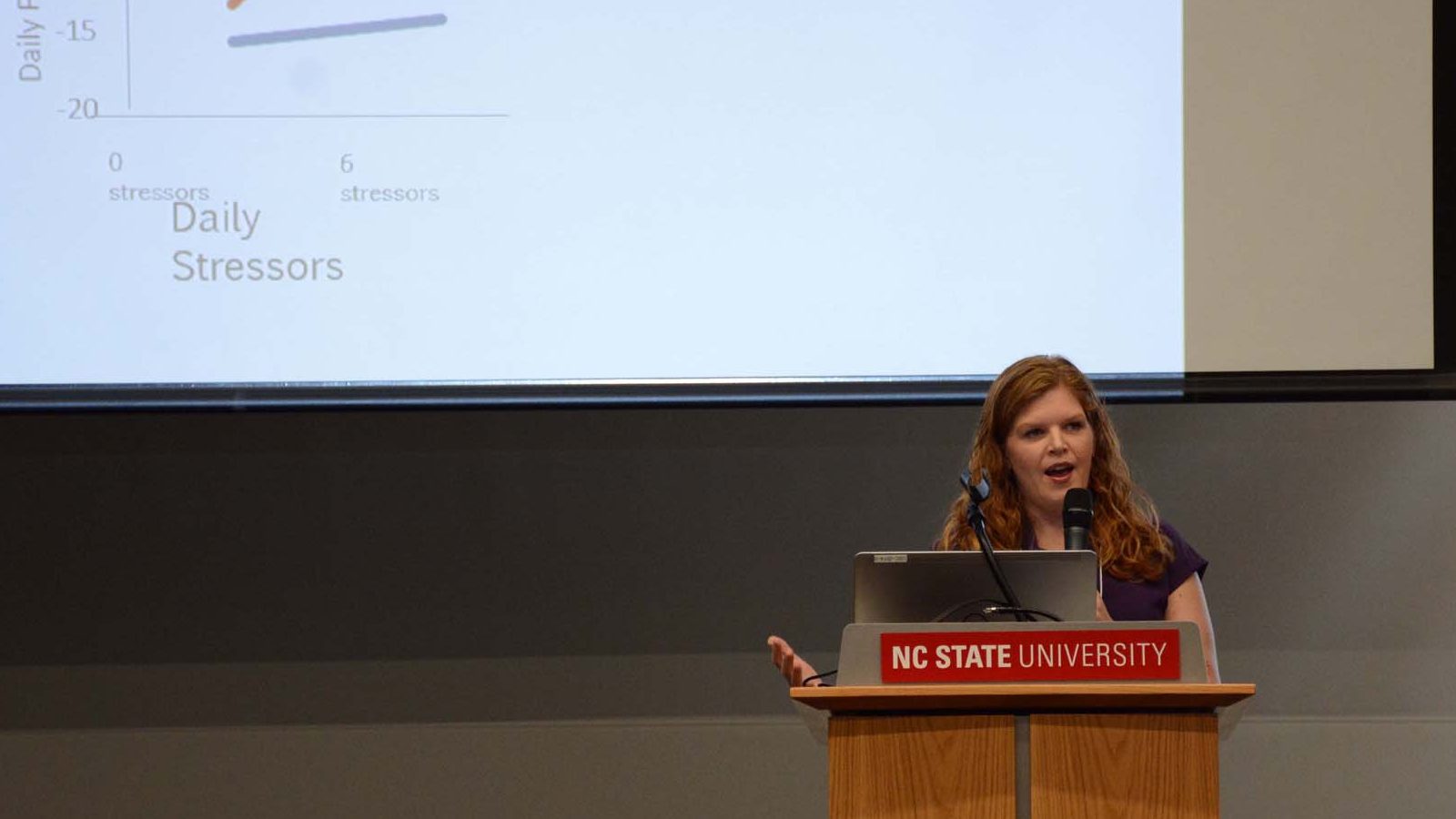Pack Hacks for Faculty: Integrating Your Personal, Professional Life

Editor’s Note: This post is by Shevaun Neupert, an associate professor of psychology in the College of Humanities and Social Sciences. It’s part of the “Pack Hacks for Faculty” series, which is published each month by the Office of the Executive Vice Chancellor and Provost.
I chose to use the term “integration” when referring to work and life on purpose. I’m not good at compartmentalizing, and when I think of work-life balance I tend to think that there should be one solution that will result in balance (and I have not found it). What follows are my thoughts and experiences based on my integration of work (tenure-track position in psychology) and life (husband and two young children, ages 4 and 2). You will need to find what works for you in your work and life, whether it be compartmentalization, balance or integration.
Challenges
Not enough time: A typical Statement of Mutual Expectations (SME) includes teaching, research/scholarship and service. Any one of the three could easily be a full-time job on its own. For example, I teach an introductory course that all of our incoming doctoral students take in their first semester, which leads many to ask me to serve on their committees. I currently serve on 30 doctoral committees.
Prioritizing properly: Prioritizing activities between work and life can be challenging, but it can also be challenging to prioritize within domains. For example, which work task is the most important? Should I spend the next 30 minutes working on a section of a grant proposal, grading assignments for a class, or writing a student’s letter of recommendation?
Expectations
The specific nature of expectations for career advancement should be detailed in your SME, but in a typical tenure-track faculty position you will be evaluated based on publications (quantity and quality), grants/fellowships, mentoring students, teaching well, and being a good departmental and professional citizen. All of these activities take a tremendous amount of time, and it is critical that you know which activities are prioritized within your department.
The bright side
Your time is flexible! Based on my own experience, there are only two scheduled events that are fixed: classes and faculty meetings. The other events in my schedule are flexible: lab meetings, office hours, committee meetings, writing, class preparation and my associate editor responsibilities. Consider leveraging the flexibility in your schedule to hack your work-life integration.
Suggested hacks
Anticipate productive times: When my first child was an infant and took a morning nap, I worked from home in the mornings so that she could nap at home before going to daycare. During that morning nap I had a clear set of tasks that I would cycle through: write an article review, post lecture outlines, run analyses for a paper, and/or go to the gym (when my husband was also home). My children have outgrown the morning nap, but they still go to bed early. While my husband is at the gym after our kids are in bed, I tend to focus on my associate editor tasks: invite reviewers, read reviews, write and send decision letters. Having a clear set of defined tasks for specific times has been helpful for me.
Integrate activities: I do my best to go to the gym six mornings a week, but I also want that time to be productive for my work. My students routinely raise their eyebrows when I tell them on the first day of class that they need to turn in hard copies of all of their assignments, but that is so I can grade them while I’m riding the recumbent bike (the one with back support so I don’t fall off!). I also use that time on the bike to review grants, journal articles, and students’ dissertations.
When I travel to give a talk or go to a conference I plan my time in transit so that I can use it effectively. While the plane is boarding or below 10,000 feet, I focus on reading printed articles or dissertations. Once above 10,000 feet, I use my laptop to work on a planned task such as revising an article for resubmission or writing the review of the printed journal article.
Differentiate urgent vs. important: Do your best to prioritize important tasks and control the volume of urgent tasks. Because I serve on so many student committees, I find myself writing many letters of recommendation and reviewing many dissertations. I apply consistent and strict guidelines to these activities: a student must give me as least one month’s notice before the deadline to write a letter of recommendation, and I must have the dissertation document at least two weeks before the defense meeting. I need to make time to work these tasks into my schedule, and by communicating these guidelines to students I decrease the volume of urgent requests.
Fiercely protect your time: Do this in a way that makes sense for your priorities and your department’s expectations. In my department, many senior faculty members work from home one day a week. I adopted this model to protect my time for writing and research because I have found that having large blocks of uninterrupted time is the best way for me to make progress on writing projects. Working from home one day a week is a good solution for me, but it is important that you know the culture and expectations in your department. This leads to my last suggested hack.
Imitate the success you see: Scan your department for faculty who may have similar work and life goals and ask them to share their own hacks. Getting suggestions from people who know your work (and possibly your life) well could yield tailored hacks that would be especially valuable.


